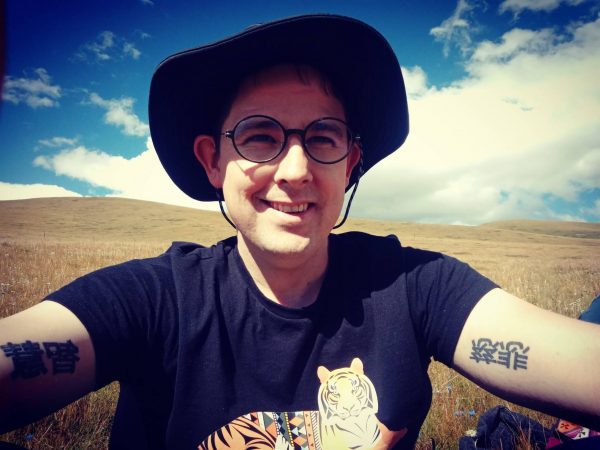Ke-Schutte navigates the “Angloscene” in Afro-Chinese relations in March 31 lecture
Joshua Zaffos
Dr. Jay Ke-Schutte was studying and teaching in Beijing, China, when a Nigerian classmate opened their eyes to an interesting paradox. The colleague was one day surprised to see a yellow school bus – common in the U.S. and American media but less so in Asia – with English-language writing on its side parked near a noodle shop at a crowded intersection.

The scene captured the collision of globalized forces and what Schutte terms the “Angloscene,” referring to the influence of Euro-American language and objects and materials within Sino-South settings and cultures. With attention to the growing populations of Africans in China and Asia, Schutte’s research explores how intersectionality – the interconnectedness of gender, race, class and other social factors – along with cultures and languages impact how people communicate and experience places – and identities of personhoods.
Schutte, a postdoctoral fellow in the Department of Communications Studies and the Department of Anthropology and Geography at Colorado State University, will share their research into this field in an upcoming colloquium on March 31 at 11:30 a.m. The virtual lecture, “Made in Others’ Wor(l)ds: Personhood and the Angloscene in Afro-Chinese Beijing,” asks the question, What is it like to be an African student in Beijing? and will address how globalized forces are shaping China-Africa educational encounters. Join the lecture via this link: https://col.st/bVFrp
Schutte is also finishing a text, Angloscene, Race-Language Intersectionality in Afro-Chinese Translations, that will expand on these topics.
“My work is situated between the research and theoretical inquiries of communication studies, on the one hand; and the methodological, empirical, and social questions of anthropology, on the other,” said Schutte who considers themselves a linguistic anthropologist and semiotician. “Taking seriously the materiality of communication in the maintenance of political, economic, and large-scale social institutions is fundamental to my research and teaching project.”
Before coming to CSU, Schutte earned their master’s degree and Ph.D. in anthropology at the University of Chicago. Their dissertation and graduate research examined the relationships among groups of African and Chinese groups in Beijing and how cross-cultural interactions affected political beliefs, linguistic patterns and views of race and gender.
Schutte grew up in South Africa during and after the 1990s amid apartheid and, through their personal experiences and scholarly work, view the era of systemic oppression as extending beyond race. Apartheid encompassed heteronormative prejudices and segregation around intersectional factors including sexuality, gender, language, and class.
Schutte will continue their research at a new position at Zheijiang University in Hangzhou, China – one of the country’s most well-respected and selective universities – after completing their postdoctoral position this spring. They also recently authored a new textbook, Counterpoints: Decolonizing the Anthropology of Globalization, based on materials and content used in their Globalization and the Social Sciences class at CSU.